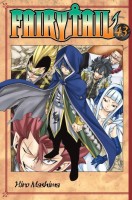My News and Reviews
Two reviews were posted at Experiments in Manga last week. The first was of Frederik L. Schodt’s classic survey of manga originally written in 1983 but slightly revised in 1986 and with a new introduction added in 1997, Manga! Manga!: The World of Japanese Comics. It may be a few decades old, but it’s still a fantastic work that is well worth reading. Last week I also reviewed Hikaru Suruga’s Attack on Titan: No Regrets, Volume 2, the final volume of Attack on Titan‘s short, shoujo spinoff which focuses on Levi and Erwin’s backstories. I wasn’t quite as fond of the second volume as I was of the first, but I did enjoy the series. It’s definitely a must-read for fans of Erwin and/or Levi and I appreciated how it expanded the setting of Attack on Titan.
Elsewhere online, Kodansha Comics announced the license of Naoshi Arakawa’s Your Lie in April. An Indiegogo campaign was launched to create a stop-motion film adaptation of Moyoco Anno’s The Diary of Ochibi manga. Vertical linked to an older article about Prophecy and how French Manga Fans Inspire the Work of Tsutsui Tetsuya. (The first volume of Prophecy was recently released in English and it’s fantastic.) And last but not least, Muse Hack posted an interview with Mikhail Koulikov of the Anime and Manga Studies Blog. I’ve been following Koulikov’s Anime and Manga Studies ever since I’ve discovered it. The blog is a great resource for anyone interested in the academic pursuit and scholarly study of Japanese pop culture.
Quick Takes
 Fairy Tail, Volume 43 by Hiro Mashima. There was very little Gray in the forty-third volume of Fairly Tail which made me a little sad, especially after the buildup in his character and story over the last few volumes. But with a series like Fairy Tail, which has a fairly large cast of characters who regularly play an important role in its plot, time needs to be spent with those other characters as well. Fairy Tail always seems to have one or two moments of fanservice that, at least for me, detract from the story being told. The clothing and armor choices for the female characters in particular tend towards stereotypical fantasy design—showing more flesh than would be appropriate for battle—but at least the women in Fairy Tail generally have well-developed personalities and are very capable characters in their own right. Often, they’re even stronger than the men. And to be fair, there’s male nudity as well as female nudity in Fairy Tail, though as might be expected from a shounen manga, generally not to the same extent. Fairy Tail is now well into the beginning of the Tartaros arc of the series in which the members of the Fairy Tail guild must face off with a dark guild of demons which is trying to eliminate the entire Magic Council.
Fairy Tail, Volume 43 by Hiro Mashima. There was very little Gray in the forty-third volume of Fairly Tail which made me a little sad, especially after the buildup in his character and story over the last few volumes. But with a series like Fairy Tail, which has a fairly large cast of characters who regularly play an important role in its plot, time needs to be spent with those other characters as well. Fairy Tail always seems to have one or two moments of fanservice that, at least for me, detract from the story being told. The clothing and armor choices for the female characters in particular tend towards stereotypical fantasy design—showing more flesh than would be appropriate for battle—but at least the women in Fairy Tail generally have well-developed personalities and are very capable characters in their own right. Often, they’re even stronger than the men. And to be fair, there’s male nudity as well as female nudity in Fairy Tail, though as might be expected from a shounen manga, generally not to the same extent. Fairy Tail is now well into the beginning of the Tartaros arc of the series in which the members of the Fairy Tail guild must face off with a dark guild of demons which is trying to eliminate the entire Magic Council.
 Kiss All the Boys, Volumes 1-3 by Shiuko Kano. For the most part I enjoyed Kiss All the Boys more than Kano’s earlier series Yakuza in Love, but ultimately I felt a bit cheated by its conclusion. While in some ways I’m glad that most everything ends happily for the characters, I’m not convinced that that’s really how things would have played out and some of the eventual pairings are troubling. But while Kiss All the Boys may not be the most believable series, at least the convoluted relationships are for the most part interesting even when they are appalling. The series hinges on Tetsuo, a straight thirty-something hentai artist with a fifteen-year-old son born from his youthful indiscretions. At least he’s supposed to be straight. Conveniently for the manga, he soon finds himself entangled in relationships with several other men—his next door neighbor, his best friend and editor, and even the boy his gay son has a crush on. Tetsuo is an asshole, but at least he knows he’s an asshole. He does make some effort to rise above his nature but unfortunately never quite manages to succeed. For the most part Kiss All the Boys is intended to be a comedy and shouldn’t be taken too seriously, but I couldn’t help but worry for the youngsters left with terrible adult role models.
Kiss All the Boys, Volumes 1-3 by Shiuko Kano. For the most part I enjoyed Kiss All the Boys more than Kano’s earlier series Yakuza in Love, but ultimately I felt a bit cheated by its conclusion. While in some ways I’m glad that most everything ends happily for the characters, I’m not convinced that that’s really how things would have played out and some of the eventual pairings are troubling. But while Kiss All the Boys may not be the most believable series, at least the convoluted relationships are for the most part interesting even when they are appalling. The series hinges on Tetsuo, a straight thirty-something hentai artist with a fifteen-year-old son born from his youthful indiscretions. At least he’s supposed to be straight. Conveniently for the manga, he soon finds himself entangled in relationships with several other men—his next door neighbor, his best friend and editor, and even the boy his gay son has a crush on. Tetsuo is an asshole, but at least he knows he’s an asshole. He does make some effort to rise above his nature but unfortunately never quite manages to succeed. For the most part Kiss All the Boys is intended to be a comedy and shouldn’t be taken too seriously, but I couldn’t help but worry for the youngsters left with terrible adult role models.
 Yukarism, Volume 1 by Chika Shiomi. I haven’t previously read any of Shiomi’s manga, but I was looking forward to Yukarism because of its promise of interesting gender dynamics, reincarnation, and historical romance. Although Yukari Kobayakawa is only seventeen, he has already made a name for himself as an author of novels set in the Edo period. He never has to do any research though since he subconsciously draws inspiration from his past life as a courtesan in the era’s pleasure district. Except for that particular twist, at this point Yukari actually isn’t a very interesting character. He’s very reserved, self-absorbed, impassive, and completely unfazed when he begins to slip back and forth between his past life and his current one. Many of the people surrounding Yukari in present-day Japan are reincarnations of people he knew in the pleasure district although they don’t all seem to be aware of that fact. There’s definitely some potential for romance in Yukarism, but after only one volume that doesn’t appear to be the series’ main concern yet. Instead, the mystery surrounding the deaths of Yukari and the others in the past seems to take precedence, although the connections between all of the characters in all of their incarnations is an important element as well. I’ll be curious to see how the series continues to develop.
Yukarism, Volume 1 by Chika Shiomi. I haven’t previously read any of Shiomi’s manga, but I was looking forward to Yukarism because of its promise of interesting gender dynamics, reincarnation, and historical romance. Although Yukari Kobayakawa is only seventeen, he has already made a name for himself as an author of novels set in the Edo period. He never has to do any research though since he subconsciously draws inspiration from his past life as a courtesan in the era’s pleasure district. Except for that particular twist, at this point Yukari actually isn’t a very interesting character. He’s very reserved, self-absorbed, impassive, and completely unfazed when he begins to slip back and forth between his past life and his current one. Many of the people surrounding Yukari in present-day Japan are reincarnations of people he knew in the pleasure district although they don’t all seem to be aware of that fact. There’s definitely some potential for romance in Yukarism, but after only one volume that doesn’t appear to be the series’ main concern yet. Instead, the mystery surrounding the deaths of Yukari and the others in the past seems to take precedence, although the connections between all of the characters in all of their incarnations is an important element as well. I’ll be curious to see how the series continues to develop.
 The Devil Is a Part-Timer! directed by Naoto Hosoda. I’ve been meaning to watch The Devil Is a Part-Timer! for quite some time now, but I was recently reminded of that intention when Yen Press licensed both the light novel series by Satoshi Wagahara on which the anime is based as well as at least one of its manga adaptations. While the anime is entertaining, the ridiculous premise is more hilarious in theory than in execution—The Devil Is a Part-Timer! is actually played fairly straight. But it’s still a fun and consistently amusing series. I particularly got a kick out of Satan diligently working in the fast food industry as a way to take over the world (he takes his job very seriously) and the portrayal of Lucifer as a hikikomori with an online-shopping addiction. For the most part, The Devil Is a Part-Timer! nicely balances its comedy with its drama. Although it has a conclusion, the ending of the series lacks finality and some of the characters introduced were never really put to good use, as though additional seasons were initially planned for but never manifested. (At least I haven’t heard anything about a second season.) Overall, The Devil Is a Part-Timer! is funny series and a nice change of pace from all of the anime centered around high school or middle school students. I might just give the original novels a try when they’re released in English.
The Devil Is a Part-Timer! directed by Naoto Hosoda. I’ve been meaning to watch The Devil Is a Part-Timer! for quite some time now, but I was recently reminded of that intention when Yen Press licensed both the light novel series by Satoshi Wagahara on which the anime is based as well as at least one of its manga adaptations. While the anime is entertaining, the ridiculous premise is more hilarious in theory than in execution—The Devil Is a Part-Timer! is actually played fairly straight. But it’s still a fun and consistently amusing series. I particularly got a kick out of Satan diligently working in the fast food industry as a way to take over the world (he takes his job very seriously) and the portrayal of Lucifer as a hikikomori with an online-shopping addiction. For the most part, The Devil Is a Part-Timer! nicely balances its comedy with its drama. Although it has a conclusion, the ending of the series lacks finality and some of the characters introduced were never really put to good use, as though additional seasons were initially planned for but never manifested. (At least I haven’t heard anything about a second season.) Overall, The Devil Is a Part-Timer! is funny series and a nice change of pace from all of the anime centered around high school or middle school students. I might just give the original novels a try when they’re released in English.

I loved The Devil Is a Part-Timer anime and really enjoyed the first novel a lot, too. So far I haven’t gotten around to reading more, but I definitely plan to. I think the anime covered the plot of the first two volumes.
Good to know, thanks! I’ll probably make a point to give the novels a try, now. The anime was a lot of fun; I’d enjoy seeing additional seasons, too.